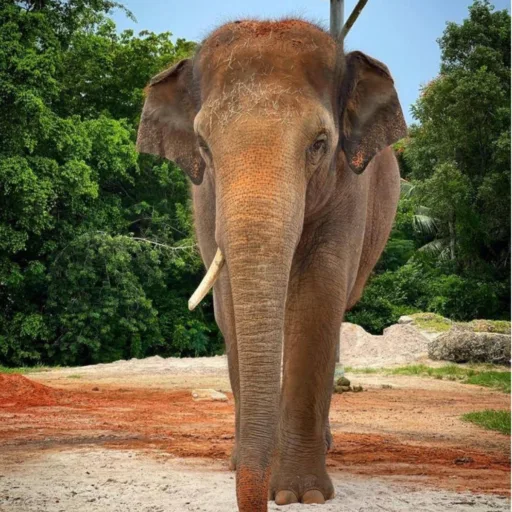
Ongard
Zoo Miami (Miami, FL)
Ongard is a male Asian elephant who was born on September 10, 2010 at the Melbourne Zoo in Australia—one of the first elephants born there as part of the zoo’s captive breeding program. In 2018, when Ongard was just seven years old, the Melbourne Zoo separated him from his mother and half-siblings and transported him more than 9,000 miles away to Zoo Miami in Florida. His transfer was arranged under a breeding loan agreement that emphasized his genetic value to North American zoos while ignoring his need for family, autonomy, and species-specific companionship. Ongard is currently confined with 3 other elephants, who all suffer from a lack of sufficient space and from being unable to engage in their natural behaviors.
Ongard is a male Asian elephant who was born on September 10, 2010 at the Melbourne Zoo in Australia—one of the first elephants born there as part of the zoo’s captive breeding program. His birth was celebrated as a conservation milestone, but for Ongard, it marked the beginning of a life shaped by captivity, separation, and suffering.
Ongard’s parents, Kulab and Bong Su, were both captured from the wild in Thailand and imported into Australia to be used for breeding. Bong Su spent over four decades confined at the Melbourne Zoo before being euthanized in 2017, when he was just 43 years old, due to arthritis.
Ongard has never known a life outside human control. From the moment he was born, his existence has served the interests of zoos—not the needs of his species. In the wild, male elephants remain with their mothers and extended families through adolescence. As they mature, they gradually begin to separate and form loosely bonded bachelor groups, where they engage in social learning, sparring, and companionship with other males. This natural developmental process is critical for their emotional and behavioral health.
In 2018, when Ongard was just seven years old, the Melbourne Zoo separated him from his mother and half-siblings and transported him more than 9,000 miles away to Zoo Miami in Florida. His transfer was arranged under a breeding loan agreement that emphasized his genetic value to North American zoos while ignoring his need for family, autonomy, and species-specific companionship.
At Zoo Miami, Ongard is one of two Asian elephants. He shares his enclosure with Nellie, a female Asian elephant in her fifties, as well as two African elephants, Peggy and Mabel. Despite the zoo’s claims that Ongard is part of a social group, Asian and African elephants are different species with distinct social structures and behaviors. Ongard has never had access to same-species, age-appropriate companionship with other male elephants, which is essential for young bulls like him.
As a pawn in the captive breeding system, Ongrad faces a range of potential harms—among them, continued invasive semen collection involving restraint and rectal stimulation, forced mating with females he does not choose, and repeated transfers between facilities as his genetic value is traded among zoos. These practices are deeply traumatic and offer no benefit to Ongard, only the continuation of a system that treats sentient beings as tools for display and reproduction.
Ongard is now in the prime of his adolescence, but he has never been given the opportunity to develop normally. He has spent his life without the freedom to choose his companions, roam over vast distances, or engage in the complex behaviors that define his species. Like so many captive-born elephants, he has been treated as an object—valued for his genetics but denied his autonomy.
Ongard’s story reflects the systemic failures of the zoo industry and its reliance on captive breeding. These programs fracture elephant families, deprive individuals of natural development, and create new generations of elephants destined to live and die in confinement.
May Ongard one day find refuge at an accredited elephant sanctuary where he can live with dignity, companionship, and space to roam. After a lifetime of captivity and exploitation, Ongard deserves freedom.
Take action today
A future where no elephant has to endure the traumas of being torn from their families and natural habitats, bred against their will, and shipped from zoo to zoo is possible, and we need your help to make it a reality.
Submit Information
Do you have a tip for us? The Free to be Elephants project relies on our supporters to keep us up-to-date with the latest news, updates and photos about elephants in their local facilities. Use this form to submit your info and help us expose the reality of elephant captivity across America.